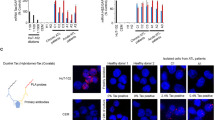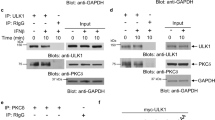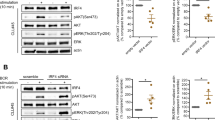Abstract
The regulatory effects of IFNγ on CD95 expression and CD95-mediated cell death were investigated in three high-risk pro-B acute lymphoblastic leukemia (ALL) lines that carry the chromosomal translocation t(4;11)(q21;q23). These leukemias are characteristically refractory to conventional chemotherapeutic treatments operating through the induction of apoptosis. However, the mechanisms leading to increased cell survival and resistance to cell death in these leukemias are largely unknown. Interferon-γ (IFNγ), a potent inhibitor of hematopoiesis, acts in part by upregulating CD95 and sensitizing cells to CD95-induced apoptosis. The t(4;11) lines SEM, RS4;11, and MV4;11 expressed low levels of CD95, but were completely resistant to CD95-mediated death. Addition of IFNγ markedly upregulated CD95 expression in SEM (8–9-fold), RS4;11 (2–3-fold), and MV4;11 (2–3-fold) lines. However, after treatment with IFNγ, only an 11% increase in sensitivity to CD95-mediated cell death was observed in SEM cells, whereas RS4;11 and MV4;11 cells remained resistant. Cycloheximide, but not actinomycin D or brefeldin A, increased CD95-specific cell death only in IFNγ-treated RS4;11 cells by approximately 12%. Abundant levels of Bcl-2 and Bcl-XL, known to inhibit CD95-signaling in some cells, were present suggesting a possible role for both molecules in the resistance to CD95-mediated cell death. Resistance of the leukemic blasts to CD95-mediated cell death and the failure of IFNγ to substantially sensitize the CD95-signaling pathway may contribute to the highly malignant phenotype of pro-B ALL with translocation t(4;11).
This is a preview of subscription content, access via your institution
Access options
Subscribe to this journal
Receive 12 print issues and online access
$259.00 per year
only $21.58 per issue
Buy this article
- Purchase on Springer Link
- Instant access to full article PDF
Prices may be subject to local taxes which are calculated during checkout
Similar content being viewed by others
Author information
Authors and Affiliations
Rights and permissions
About this article
Cite this article
Dörrie, J., Schuh, W., Keil, A. et al. Regulation of CD95 expression and CD95-mediated cell death by interferon-γ in acute lymphoblastic leukemia with chromosomal translocation t(4;11). Leukemia 13, 1539–1547 (1999). https://doi.org/10.1038/sj.leu.2401479
Received:
Accepted:
Published:
Issue Date:
DOI: https://doi.org/10.1038/sj.leu.2401479



